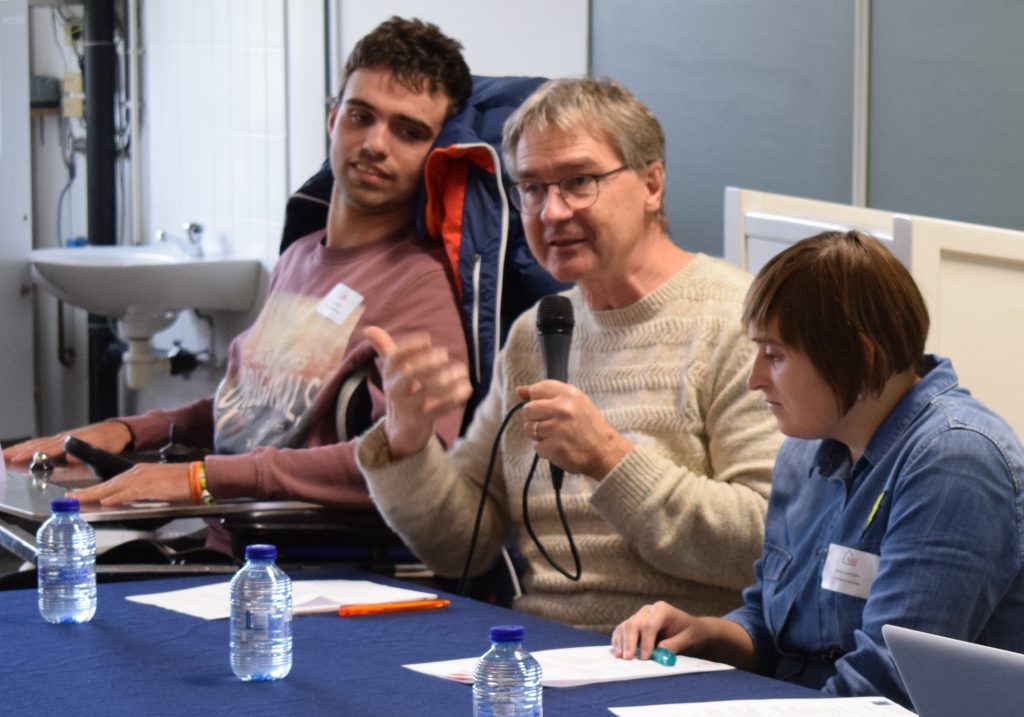Inclusive Campus Life: Experts share ideas on Campus Accessibility
Click here for the easy-to-read version
In November, Inclusive Campus Life (ICLife), a project Inclusion Europe participates in, held their event, “Mini Conference ‘Campus Accessibility’”. The event took place at the Thomas More campus in Geel, Belgium.
The overall goal of the ICLife project is to promote and support the inclusion of people with intellectual disability in campus life.
Throughout the two-day event speakers and attendees came from all over Europe to discuss good practices and models of accessibility for people with intellectual disabilities in higher education.
Some of the topics covered were digital accessibility, internships for people with intellectual disabilities, and social inclusion.
Speakers included Jeroen Knevel, Caron Landzaat and Dr. Jean-Pierre Wilken from Utrecht University, Dr. Marc Dujardin from KU Leuven, and representatives of different Thomas More campuses.
Accessibility through Universal Design
The event also saw the coordinator of the ICLife project, Aleidis Devillé, present the first outcomes of this international Erasmus+ project.
Devillé discussed how the programme had looked to address accessibility of the campus by taking into account principles of universal design. Based upon this approach, impediments to campus accessibility for people with intellectual disabilities include a lack of icons and pictograms throughout the campus, as well as the inaccessibility of the reception area and the public transportation linked to campus.
Aleidis Devillé also introduced BlueAssist, an application that can help people with intellectual disabilities, elderly people, and people who speak a foreign language navigate different situations such as using the bus, asking for directions, and ordering at a restaurant.
“The course was great, I wish it had lasted even longer!”
Self-advocates who already had followed studies at the Thomas More, Geel campus shared their experiences in a panel presentation. They stressed that they thoroughly enjoyed being students. Their only regret? “I wish the course had lasted even longer!” – preferably a full 2 years.
During the two-day conference, experts spoke on Inclusive Education and held discussing various case studies on accessibility in a higher education setting.
Workshop and presentation topics included a framework/ evaluation system for university campuses, a buddy system for people with intellectual disabilities, and assistive technology.
Inclusion Europe is glad to participate in the ICLife project to support inclusive education, not only to foster the inclusion of students with intellectual disabilities at universities, but also to promote their involvement as lecturers and experts, for example in the fields of social work, health, education or law.
All presentations and further details of the project are available at www.ICLife.eu
Easy-to-read version
Click on a word which is in bold to read what it means.

In November, Inclusive Campus Life (ICLife) held an event
on Campus Accessibility.
The event was held in Geel, Belgium.
Inclusive Campus Life is a project Inclusion Europe participates in.
The overall goal of the ICLife project is to make life on a campus
for higher education more inclusive.
Higher education is schooling beyond high school such as university.
ICLife supports the inclusion of people with intellectual disabilities
in campus life.
The event lasted two days and speakers and participants
came from all over Europe.
The participants discussed accessibility for people
with intellectual disabilities in higher education.
Some of the different topics that people spoke about were accessibility on computers and on the internet
and internships for people with intellectual disabilities.
Speakers included Jeroen Knevel, Caron Landzaat
and Dr. Jean-Pierre Wilken from Utrecht University.
Utrecht is a city in the Netherlands.
Speakers also included Dr. Marc Dujardin from KU Leuven
and people from different Thomas More campuses.
KU Leuven and the Thomas More campuses are in Belgium.
At the event Aleidis Devillé talked about the ICLife project.
Aleidis Devillé leads the ICLife project.
Aleidis talked about how the programme looked at how to make
the campus more accessible.
For example, by making sure that the reception area is accessible.
Or by making sure that public transportation is accessible for everyone who wants to go to university.
Another example was putting icons and pictures
everywhere on the campus.
Icons and pictures are important for people with intellectual disability.
Icons and pictures can help you to find your way around.
Aleida’s also talked about Blue Assist.
Blue Assist is an app that you can get on your phone.
The app can help people with intellectual disabilities, old people
and people who speak a different language.
Blue Assist helps people in lots of different situations
like taking the bus, asking for directions, and ordering at restaurants.
Self-advocates who had been students at Thomas More
spoke on a panel.
The self-advocates said that they really liked being students.
They even wished that the course was longer.
During the two-day event experts spoke about Inclusive Education.
Some of the workshop topics included how to look at how good
the inclusive education program is, a buddies for people with intellectual disabilities and technology to help people.
Inclusion Europe enjoyed being a part of this event.
We want to make sure that in future people with intellectual disabilities cannot only be students at university.
We also want to make sure that they can work as teachers.
For example for people who study law or healthcare.
All the presentations and more information about the project are on www.ICLife.eu





1 Response
[…] can read here about an event that ICLife […]